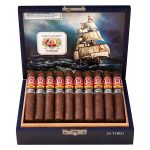Cuban cigars are often considered the gold standard in the world of cigars, known for their exceptional flavor, impeccable craftsmanship, and rich history. However, their popularity means there are plenty of fakes out there. Whether you’re a seasoned cigar lover or just starting out, here are some tips to help you spot the real deal.
1. Where It Comes From and the Branding
a. Made in Cuba: Only cigars made in Cuba can be called Cuban cigars. They’re often labeled “Habanos,” a term strictly controlled by the Cuban government. If it’s not made in Cuba, it’s not a Cuban cigar.
b. Well-Known Brands: Look for brands like Cohiba, Montecristo, Romeo y Julieta, Partagás, H. Upmann, and Hoyo de Monterrey. These brands are legendary and synonymous with Cuban quality.
2. Packaging and Presentation
a. The Box and Seals: Authentic Cuban cigars come in high-quality wooden boxes with a green and white Habanos seal. You’ll also find a holographic Cuban warranty seal to ensure it hasn’t been tampered with.
b. Barcodes and Serial Numbers: Each box has a unique serial number and barcode you can check on the Habanos website. This is a surefire way to verify authenticity.
c. Cigar Bands: Genuine Cuban cigar bands are sharply printed and embossed. Any spelling mistakes or poor print quality should raise red flags.
3. Construction and Quality
a. The Wrapper: Cuban cigars have smooth, oily wrappers with minimal veins. The wrapper should feel silky and have a uniform color. Rough textures or color variations might indicate a fake.
b. Triple Cap: Look for the traditional triple cap at the head of the cigar. This is a signature feature of Cuban craftsmanship.
c. Consistent Construction: Cuban cigars are rolled using a special technique called “entubar,” ensuring an even burn and smooth draw. The cigar should feel firm and evenly packed without soft spots or hard lumps.
4. Flavor and Aroma
a. Rich Flavor: Cuban cigars are famous for their complex and balanced flavors. Expect a mix of earthy, spicy, and sometimes sweet notes. The flavor should evolve as you smoke.
b. Unique Aroma: Before lighting, Cuban cigars often have a grassy or barnyard aroma. When smoked, the aroma should be rich and pleasant, not harsh or overpowering.
5. Price and Availability
a. Premium Price: Cuban cigars are expensive due to their quality and the effort involved in making them. If a deal seems too good to be true, it probably is.
b. Hard to Find: Because of trade restrictions and high demand, genuine Cuban cigars might be tough to come by. Stick to authorized Habanos retailers to avoid fakes.
6. Get a Second Opinion
a. Talk to the Experts: Experienced cigar aficionados or reputable cigar shops can help verify the authenticity of Cuban cigars. Authorized retailers have a reputation to protect and are less likely to sell counterfeits.
b. Online Checks: Use online tools to verify the serial numbers and seals on the boxes. The Habanos website is a great resource for this.

